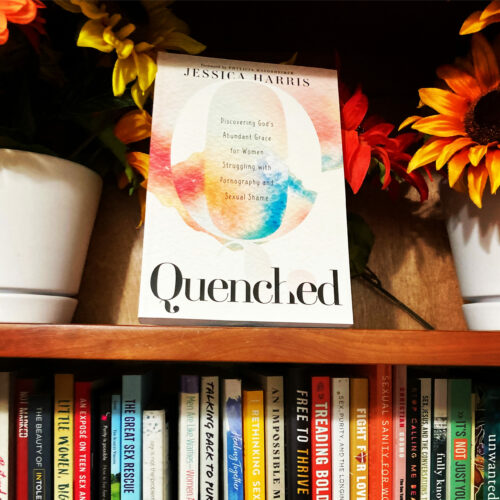
Sharing Your Story with Family: Thoughts on Shame, Grace, and Loss
It’s a question so many women have: How am I supposed to tell my family? My husband? My kids? My parents?
Perhaps you didn’t know this. Maybe you did. But my family doesn’t talk about what I do.
It’s a complicated dynamic. Along with fierce loyalty and love, there’s some toxic shame and legalism and blame that likes to creep in to the fibers of our family. Some conversations just feel like they aren’t worth the fall out.
So, I just kept my book out of the conversation, and my family did too- at least to my face.
Then my husband-to-be read it. Since that’s literally how he and I met, the book could no longer go unmentioned. Some family members bought their own copies. Sure enough, fall out. It felt like with each time someone new read it, I would have to fight through another wave of shame and condemnation. Each time, it seemed to justify exactly why I don’t share my story with my family.
Earlier this year, a family member who has read my book emailed me to let me know my grandfather was looking for it. He had emailed her and asked her for the title because he wanted to read it.
She cautioned me that the book could generate a lot of feelings of hurt and denial, even anger. She felt I should sit down with my grandfather to tell him my story in person before he got his hands on a copy of Beggar’s Daughter.
Absolutely not.
In fact, I got angry with her and wrote a scathing email in return venting about how I was sick of the toxic environment of our family. I was tired of people misunderstanding grace, and tired of shame, and how dare she try to saddle me with the responsibility of how my grandfather felt. That wasn’t my problem. If he wanted to read it, fine! In fact, I would set him a copy. Let him read it.
In case you think I have my life all together, let me assure you, I do not. I mess up on a daily basis and still struggle to tame my tongue at times.
I wrote back hours later and apologized to her.
Is our family perfect? No. But every family has a bit of poison in their veins. It’s called sin. Did she deserve a tongue-lashing? Absolutely not.
I decided to try to take charge of the situation and wrote my Grampa an email telling him I would mail it to him. I threw a copy in my car to take to the post office, but never got around to sending it. I just didn’t make it a priority.
It was nothing new. For a couple years my Grampa had asked to read it.
I always found a way to change the conversation… because I didn’t want to have it.
One dynamic of my family is that once one person knows something, everyone finds out about it. It drives me absolutely bonkers and has ever since I hit puberty at the age of 12 and was soon getting “congratulations” from old ladies I didn’t even know at church.
I feared that once Grampa read my book, everybody and their second cousin was going to know his opinion about my story. It wasn’t worth the fall out. Wasn’t worth the awkward silence at family gatherings. Wasn’t worth the cutting comments and the continued branding, the continued need to explain a past that God has forgiven.
Once, at the dinner table, he loudly protested, “A grandfather has a right to read what his granddaughter has written.” One of my brothers intervened. “Grampa, you aren’t really the intended audience,” he said carefully, knowing the dynamics of our family and a generations-long struggle to fully understand grace.
When I still hadn’t mailed the book, Grampa sent an email. He asked me to have the book ready for him the next time we met. We planned to meet Monday a couple weeks later. I thought about mailing the book but then decided I would wrap a copy up with a letter and give it to him when we met on Monday.
The Friday before, Grampa died.
Instead of a lunch to cheer him up, share my book, and let him snuggle my daughter, I spent Monday lunch sitting beside my weeping grandmother and hugging my mom.
I spend a lot of time on here talking about shame and grace and the need to know your identity in Christ. But I’ll be honest with you, I don’t always get it right.
Don’t think that just because I sit here and write and stand on stages and share that I’m somehow fearless and never get beaten down by shame.
But in that scathing email to my family member, I realized one truth. My book, my story, your story- it isn’t about what you’ve done.
That’s what shame likes to focus on. “Oh my goodness, look at what you’ve done! How could you do that!” That’s when we fear the labels, the branding, the scarlet letter. We fear forever being known for what we’ve done. We fear it being weaponized and used against us.
But our stories should never be only about what we’ve done.
If Beggar’s Daughter were only about my struggle with pornography, then, yes, that would be weird for my Grampa to read.
But Beggar’s Daughter was always about grace. And there is no “intended audience” for that.
I wish that would have clicked with me months, even years ago. Maybe it did in word, but never in application. Maybe it sounded great in blog posts and emails, but I struggled to believe it myself.
For days, I mourned the fact that I had never shared my book with Grampa. Then I found out that another family member had given him a copy and he had read it. He had read it cover-to-cover before he sent the email asking me for a copy. Maybe he forgot he read it. Maybe he was trying to give me a chance to share it myself. I’ll never know. But I know he read it.
And it brought up questions, questions that he asked other people- not me. Conversations about addiction and struggle and feelings of guilt for things happening “under his roof without him knowing.”
The biggest regret isn’t failing to share my book, it’s that I missed out on those conversations- conversations that could have spoken grace and healing.
An entire conversation about my story took place in my family without me.
It was an opportunity to start changing the conversation in my own family, and I missed it. While trying to keep my family away from my story, I inadvertently pushed them away from me altogether. I didn’t want to talk about my porn problem with them and, in turn, missed out on the opportunity to talk about grace, which is ultimately what I want to talk about.
I’ve said this to churches and now I’ve unfortunately found it true in my personal life:
If you’re silent about the sin, you’re silent about grace.
Grampa understands grace now, in all its fullness, but I’m sad I missed the opportunity to talk about it with him.
I feel like it’s an important thing to remember, especially for those of you who are recovered and wondering who to tell and how.
If you’re bending over backwards to keep people from finding out your story because you don’t want to deal with the fall out, can I encourage you to reconsider?
Is it hard to feel judged? Yes.
Is it hard to feel labeled? Yes.
Are there some days where the honesty doesn’t seem worth the fight that comes next? Absolutely.
Are there some family systems that will take your story and attempt to use it against you? Unfortunately, yes.
Are there some families that will “never” forgive you for what you’ve done? Possibly.
We each have to go with what we know of our own families. So, I’m not telling you to give your Grampa a written copy of your story. But if you had an opportunity to share the whole of your story, including how God changed your life and set you free, would you do it? If you knew it could completely change your family for the better, would you share it?
For years, I avoided taking that risk. It didn’t seem worth it.
But losing Grampa, and losing out on those conversations with Grampa, changed that.
The night before his funeral, I sat with members of extended family in Grampa’s old living room. The house where I grew up. Family members who know very very little of what I do and may not even know I have a book.
And they asked how my husband and I met.
We have two versions of the story: the one where we talk about my book, and the one where we talk about meeting at “apple picking” (if you’re confused, our whole story is here). We typically do the “leave the book out” option because I don’t want to deal with the litany of questions that follows next.
You have a book?
What’s it about?
Can I have a copy?
Why do women do that?
Real pornography?
But as I sat there in Grampa’s living room, my husband at my side, I told them about my book. It didn’t go in depth. The book is just the starting point of our love story so my family quickly got wrapped up in the rest of it and how we interact now and our little girl crawling all over the floor. It wasn’t any sort of soul-bearing in-depth conversation, but even talking about the book with my family, in person, is a huge step for me. It was a scary one, but ended up being a sweet opportunity to share our love story, in its fullness, with laughter.
And I think that’s what God wants for us. Freedom. Freedom from shame. From fear. From the labels of our past. Freedom to step into the abundant life promised to us. Freedom from the chains, the condemnation, even the side-eyes at Thanksgiving dinner.
I’d challenge you. Are you willing to walk in freedom, regardless of what your family thinks?
Willing to share how God changed your life. Willing to share how you struggled. Willing to live that abundant life in front of their eyes- a testimony to Grace and the freedom that is found, not in our families, but in God.
That’s the challenge I have for myself- to live abundantly. Whole. Redeemed. Loved. Free.
“So if the Son makes you free, then you are unquestionably free.” John 8:36 (AMP)




